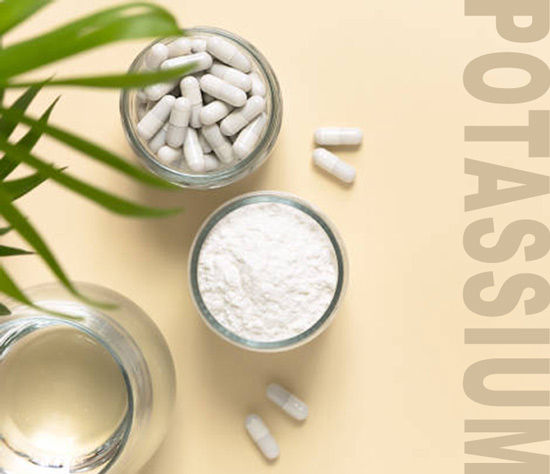A study concluding that potassium-rich diets are “associated with lower blood pressure” is the third such study in three years highlighting the mineral’s capacity for protecting vital organ function.
Potassium is often overlooked by health consumers; however, it is critical for many physiological processes, including fluid and electrolyte balance.
During the past three decades potassium has been studied extensively for its heart and kidney benefits.
Potassium is one of the 15 minerals the National Institutes for Health lists as essential for good health.
When discussing potassium as an essential nutrient, most people immediately think of bananas since they are known to have a high potassium content; however, many other fruits and vegetables also contain high amounts of potassium. In fact most types of potatoes have more potassium by weight. (See sidebar listing on this page for examples.)
Current study
The study was published in the European Heart Journal, a publication of the European Society of Cardiology, in August 2022. Though results were only recently published, the study covered an exhuastive time period—beginning in 1993.
The study included 24,963 participants of the larger EPIC-Norfolk study. The study involved 40 to 79 year olds from general practices in Norfolk, UK, between the years 1993 and 1997. The average age was 58.5 years od.
Participants completed a questionnaire on lifestyle habits, then blood pressure was measured, and a urine sample was collected. Since part of the goal of the study was to examine the relationship between salt intake and potassium intake, urinary measurements of sodium and potassium were used to estimate dietary intake. Participants were divided into tertiles (low/medium/high) according to their sodium intake.
During a follow-up period of 19.5 years, 13,596 (55%) of the participants were hospitalized or died due to cardiovascular disease. In the overall cohort, people in the highest tertile of potassium intake had a 13% lower risk of cardiovascular events compared to those in the lowest tertile.
When men and women were analyzed separately, the corresponding risk reductions were 7% and 11%, respectively.
Notwithstanding the general cardiovascular protection potassium provides, researchers reported the most noticeable protection was seen when examining sodium intake.
When comparing sodium intake, the greatest protection was provided to women with high-sodium diets. In this group every one gram increase in daily potassium was associated with a 2.4 mmHg lower systolic blood pressure.
Two studies in 2020
A 2020 meta-analysis of randomized controlled trials assessing the relationship between potassium supplementation and blood pressure also found potassium was beneficial in lowering blood pressure.
Once again researchers found that participants with a high sodium intake benefitted the most from potassium supplementation: “The blood pressure‐lowering effects of potassium supplementation were stronger in participants with hypertension and at higher levels of sodium intake.”
Potassium Content of
Common Foods
• Potato (medium-sized, baked) = 925 mg
• Avocado (1/2 of medium-sized) = 500 mg
• Banana (full medium-sized fruit) = 425 mg
• Pinto beans (1/2 cup, cooked) = 400 mg
• Yogurt (1/2 cup, varies by type) = 260-435 mg
• Papaya (1/2 of medium-sized fruit) = 375 mg
• Milk (1 cup, varies by type) = 350-380 mg
• Lentils (1/2 cup, cooked) = 365 mg
• Mango (1 medium-sized) = 325 mg
• Salmon (3 ounces baked/broiled) = 320 mg
• Molasses (single teaspoon) = 295 mg
• Tomato (medium-sized, raw fruit) = 290 mg
• Mushrooms (1/2 cup, approx.) = 280 mg
• Turkey (3 ounces, roasted, dark) = 250 mg
• Brussel sprouts or squash (1/2 cup) = 250 mg
• Sunflower seeds (1/4 cup) = 240 mg
• Orange (one, small-size) = 240 mg
The meta-analysis included a review of 32 published trials and was conducted by researchers at University of Modena and Reggio Emilia in Modena, Italy and at National and Kapodistrian University of Athens in Athens, Greece.
The study, entitled Potassium Intake and Blood Pressure: A Dose-Response Meta-Analysis of Randomized Controlled Trials, was published in the Journal of the American Heart Association in June 2020.
Later in 2020, and on the other side of Europe, another university study examined the benefit of potassium intake with regards to kidney function.
The retrospective cohort study, conducted at Amsterdam University Medical Centre in the Netherlands, included 541 outpatient subjects who were tracked for a substantial 17-year follow-up.
At the conclusion of the cohort researchers reported the study subjects with the highest potassium intake demonstrated “a significant 76% reduction in renal outcome, and 73% decrease of cerebrovascular events.”
During the follow-up period, researchers were even able to pinpoint an exact ratio of potassium intake and likelihood of kidney failure: “A 20-mmol increase in potassium intake was associated with a 24% reduction in renal outcome,” the study’s authors wrote.
The study was published in Clinical Nutrition in December 2020.
Concluding thoughts
The World Health Organization recommends that adults consume at least 3.5 grams of potassium and less than 2 grams of sodium (5 grams of salt) per day.
Fortunately high potassium foods are abundant and include vegetables, fruit, nuts, beans, dairy products and fish. Any diet that strictly limits processed foods is likely achieving an adequate intake; however, taking a nutritional supplement that includes potassium can guarantee it.
Professor Liffert Vogt of Amsterdam University Medical Centers summarized pointedly: “Our findings indicate that a heart healthy diet goes beyond limiting salt to boosting potassium content… we should all prioritize fresh, unprocessed foods since they are both rich in potassium and low in salt.”
– – –
Potassium is an important part of the following Optimal Health Systems products:
• Optimal Collagen Plus
• Opti-Pak
• Opti-Heart
– – –
Sources: European Heart Journal, Journal of the American Heart Association, Clinical Nutrition.


